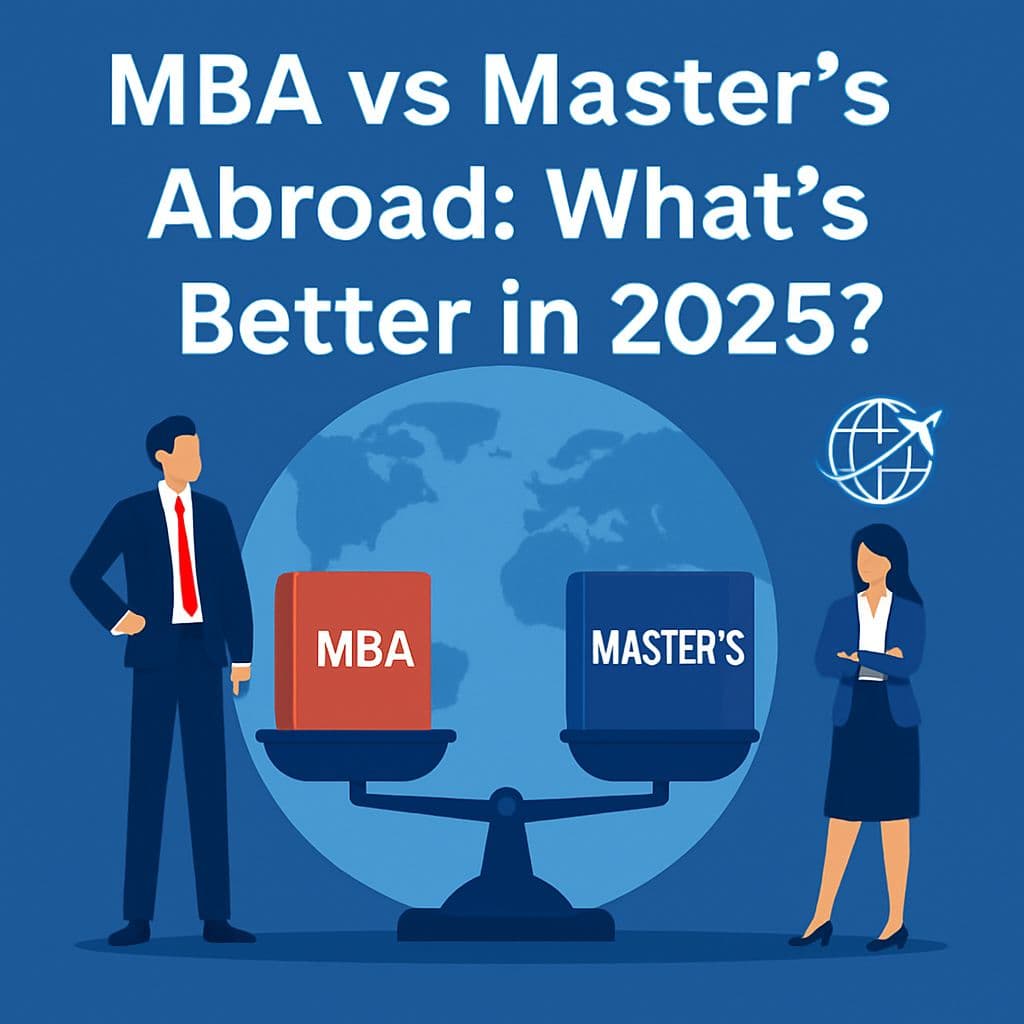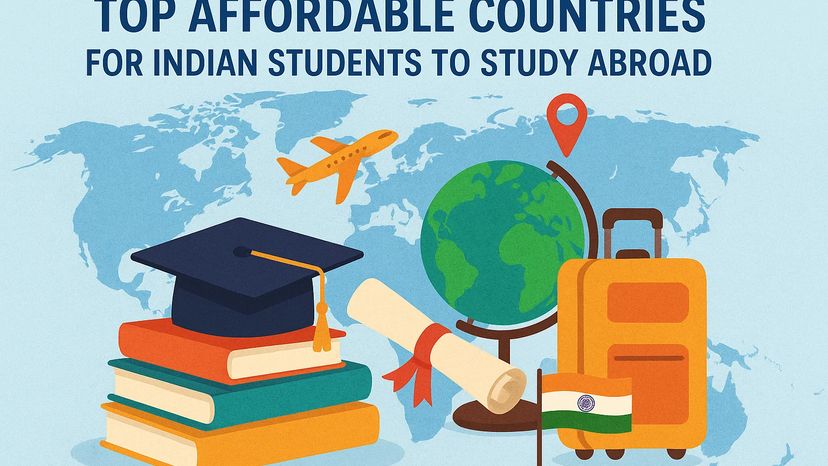In today's more globalized and competitive world, postgraduate degree selection is no longer a clear-headed choice. The two most popular destinations of many students and other professionals who desire to advance their careers are MBA in a foreign country or Masterrate degree in a foreign country in a specific field. However, moving into 2025, the question we have to ask ourselves is … MBA or Masters in a foreign country?
This comprehensive manual will show you all that you should consider: program organization, advantages, salary-related questions, employment after you complete the program, global trends, and so on. The course will help you to come up with the understanding to make an informed decision on whether or not to do MBA or Masters so that it supports your career goals.
Table of Contents
- What is MBA
- What is Masters Degree
- Key Differences
- Top Destinations
- What do the trends say
- Cost Comparison
- Which is Better
- FAQs
- Conclusion
1. What is an MBA?
Master of Business Administration (MBA) is the graduate degree in business administration which covers areas of business leadership, strategy, business operation, finance, marketing, and entrepreneurship. It is a perfect complement when a professional wishes to graduate to management, change their careers or start their own businesses.
Key Features:
Time: 1 - 2 years
Experience Experience: It requires 2-5 years of working experience.
Interest: Headship, business planning and financial aspects, entrepreneurship
2. What is a Masters Degree?
A Masters degree abroad is a postgraduate degree course in a certain subject area like Data Science, Engineering, Psychology or International Relations. It is generally more research-based and is applicable to people who seek more knowledge in a technical or academic subject.
Key Features:
Duration: 2 to 1 years
Experience: Will accept fresh graduates
Students interested: Academic, specialities, technical expertise
3. MBA vs Masters: Key Differences
Factor
MBA Abroad
Masters Abroad
Entry Requirements
GRE/IELTS, Less/no work experience
Curriculum
Business & leadership-focused
Subject-specific specialization
Career Path
Managerial & executive roles
Technical or academic roles
Networking
Strong alumni network & business connections
Limited to field-specific circles
Cost
Typically higher ($40,000 – $100,000)
Generally lower ($20,000 – $60,000)
Salary Potential
Higher average ROI
Moderate depending on field
Salary Potential
Varies according to role
Varies according to role
4. Top Destinations for MBA and Masters Abroad
For MBA Overseas 2025:
- USA (Harvard, Wharton, Stanford)
- UK (London Business School, Oxford)
- Canada (Rotman, Ivey)
- Singapore (INSEAD, NUS)
For Masters Abroad 2025:
- Germany (Free/low tuition, strong STEM programs)
- Netherlands (Global outlook, English-taught programs)
- Australia (Tech, psychology, environmental science)
- France (Strong in arts, fashion, and business)
5. What the trends say about MBA 2025 or Masters 2025?
Future trends in work, new abilities in 2030, and the growing digital transformation are the features of the world education and labor market of 2025. This is how they will influence your decision:
Trends of MBA in Abroad:
- Employers prefer MBA graduates that have a digital transformation education.
- There are increasing numbers of Specialty MBAs (e.g. Tech MBA, Sustainable Business).
- MBA and masters salary demonstrates that MBAs are ahead of average paychecks especially in consulting and finance.
Trends of Masters Study Abroad:
- Liberal arts degrees are not in demand, STEM degrees there are; AI, Data Science, and Cybersecurity.
- Other countries such as Germany and Canada are also providing superior Masters abroad incentives such as low tuition and post study work visas.
- Most Universities are integrating research and work experience, which is providing a grey line between MBA and special Master degree.
6. Cost Comparison
Degree Type
Cost (USD equivalent)
Masters
$20,000 – $90,000
MBA
$60,000 – $130,000+
7. MBA or Masters Abroad-Which is Better?
The solution depends on you and the following:
- Career stage: It is better to have a Master degree when you are still in the initial stages of your career. An MBA can be more beneficial to mid-career professionals.
- Career ambitions: Do you wish to be a team leader? MBA. Have this desire to become an expert in a field? Master’s.
- Budget: They are masters, so they tend to be cheaper.
- Trade: Tech, science and academia prefer masters; business finance and consulting prefer MBAs.
Finally, your personal objectives, financial decision-making ability and working experience will assist in considering which of your choices has greater benefits of MBA abroad or Masters abroad.
Which is better - MBA or Masters degree in terms of salary?
On average:
- The graduates of MBAs receive an average salary of $90,000 to 140,000 a year after completing their courses.
- Graduates of master degree earn between 60,000 and 100,000 US Dollars depending on the area and locality.
But ROI is also tied to conditions in the job market, competencies required in 2030 and careers of the future, an area that values more and more hybrid business and technical skills.
1. MBA or Master in a foreign country, which is better?
It all depends on the career goals you have. Master specialization should be done via the Master program, as opposed to an MBA, which is the most appropriate in case of a leadership role.
2. Does MBA sell in 2025?
Well, yes, particularly (but not exclusively) when you are looking at sustainability, or tech, or global strategy. It is very ROI, and occupationally-portable.
3. What will be my salary as an MBA in 2025 versus a Master degree?
MBA grads: $90K-140K Master grad: $60K-100K hangs on industry, location.
4. In foreign countries, is it possible to do an MBA without working experience?
It can be done in a few programs (e.g. early career MBAs), most of the top schools require 2 to 5 years experience.
5. Can it be cheaper getting a Master degree abroad?
Yes. The tuition of a master is lower, on average, than that of MBA studies and also might be received with research scholarships.
6. What are the MBA abroad benefits?
Changes in careers, development of leadership, international lives, networking, and increased pay.
7. How do I decide when I’m torn between whether I get an MBA or Masters?
Write down your ambitions, finances, experience and need in the industry. Get a career counselor or go with a decision-making model.











